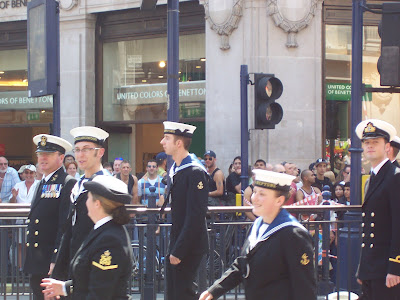I am halfway through Byatt’s new book,
The Children’s Book, and I love it. I stayed up late last night to get through some more chapters. Now, I want to stop reading it to delay the pleasure of having more of it left to read. So, to sort of fulfill that desire and to start thinking more critically about her new book – which I am finding an interesting sort of departure from her other material – I was stroke by this strand of the novel that corresponded to this movie I have recently been obsessed with, Reds. Also, how this one character Charles/Karl talks about the poor makes me think about my own relationship to the visible homeless, poor, and destitute of the streets. (Which is just so uncanny and weird. It is like all of these things in life start to echo one another. Being accosted byesperate, homeless woman and discussing it with friends. Watching
Reds. Reading about socialism and current politics and how this is echoed in the
Up Series. Talking with LT about the homeless in NOLA.) Anyways, here is some passages:
“[Charles’s/Karl’s] own essay had been a rather perverse, but certainly clever, demolition of the dream of the good life in William Morris’s News from Nowhere, and the kind of communities associated with it, who wore hand-printed skirts and ate vegetables. He wrote that the dream of Heave had always worried him because it was so boring – there was nothing to do – and the dreams of Heaven on Earth, going back to the land, living in vegetable gardens and little plots of flowers, with no machines to be seen anywhere, struck him as a sleepy refusal to look at real problems and make real plans about what to do. He quoted Morris against himself
Dreamer of dreams, born out of my due time
Why should I strive to set the crooked straight?
He was indeed, wrote Charles/Karl censoriously, ‘the idle singer of an empty day’ (174).
Just a couple pages earlier, Charles/Karl said to his tutor, “What I can’t see – what I really can’t see – is why everyone doesn’t ask themselves that, all the time [why are the poor poor?]. How can these people bear to go to church and then go about in the streets and see what is there for everyone to see – and get told what the Bible says about the poor – and go on riding in carriages, and choosing neckties and hats – and eating huge beefsteaks – I can’t see it” (170). Charles/Karl is rejecting the life of his banker father who is manipulating the poor and Africans through the gold trade. Charles’s/Karl’s rebellion comes through his involvement in the anarchist movement. He eventually meets Emma Goldman in Paris, etc. I haven’t quite got to a part where we will see where he ends up, but his is one of the more interesting threads of the novel because of the fact that it seems so much like a surplus for the other narratives. In many ways, his story is there for comparative reasons. But maybe it is the story we are supposed to learn so much more from. Not sure? However, maybe I should reveal some of my stupidity. Um, I had totally never though of Heaven as Utopia. Okay. Yeah, a little crazy. But I just didn’t think of it in that terminology before. And when Byatt writes about his essay and the discussion of Heaven – I was so piqued. I also find myself a little reactionary to the passage because I know so many people that I are trying to live “off the grid,” and I’ve seen so many things documentaries about these types of people (another echo –
Into the Wild,
Grizzly Man).
What I think is so interesting is that Charles/Karl discusses something that I have issue with in this whole agrarian throwback movement and its nostalgic overtones. By ignoring progress and the current world and reverting back to medieval, pre-Industrial life, is that really solving anything? Certainly you might escape the ills of contemporary society, but isn’t it naïve to think that you are really escaping anything. I mean these societies, communes, trailers, houses, farms are just as utopic (? Utopia-like) as Shaker communities, Edward Carpenter’s pastoral visions, or Lawrence’s Rananim. And yet, I feel that I have no real right to bitch about some of this stuff because it is not like I am living in this type of community nor am I walking the street trying to save lives. I certainly talk the talk of activism and civil liberties and working for gender equality, etc., but when it comes to walking the walk, I think my lungs are still expanding. I take a couple steps on the path but never really get too far. Am I thus guilty because I am okay with my own bourgeois status?
Right, maybe, I don’t know? It is extremely unclear to me where Byatt stands on this issue, but her characters run the gamut of positions. Whereas Charles/Karl reacts to violently against this, it is clear that one of this foils, Tom, needs this type of ignorance to avoid the pain of society – although his pain is more social and not classed or technologically related. I think in the context of the book I am poised in the middle of her discourse concerning this topic so I am interested to see where this thread continues. As of now, Charles/Karl has just met Emma Goldman and some more Russian and German anarchists in Paris. Now that he is back in England, I don’t know what he will become or use this experience, but I can’t wait to find out.
Byatt, A. S.
The Children’s Book. London: Chatto & Windus, 2009.








